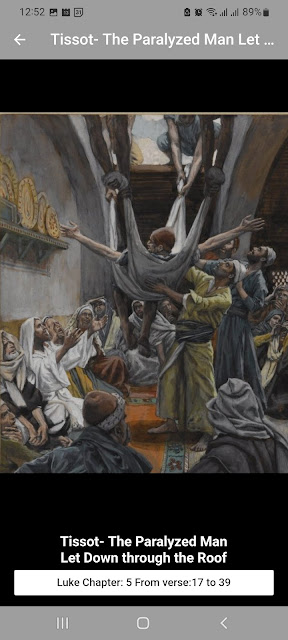e) On Charity Matt 6:1-4
Do good to please God and not men. When you act charitably, let not your left hand know what the right is doing. This is not the way of the world; benefactors will generally want to be looked upon as such.
Prayer and fasting (Matt 6:5-18). These are a form of Charity. We pray for others and ourselves and we fast as a way of showing our resolve for what we ask. It is meant to be a private affair between you and your maker. Exhibitionist tendencies are a form of seeking people’s approval; according to Jesus, this is all the reward you will get, so stop doing it.
KINDLE E-BOOK
An excellent example of righteousness is the story of the widow's offering (Mark 12:41-44). Her offering amounts to more than all the others, despite its small amount. The Lord states that she gives out of her penury, while the vast majority give out of their plenty; don’t we all rank very much among them? If there is a teaching that I have always felt uneasy about it is this one, for I find it almost impossible to emulate. She is completely trusting of the Lord, to attend to her every need and thus gives the last of what she had.
f) On the love of God and of neighbour Mark 12:28-34
As for the love of neighbour, we say you think of others before you think of yourself as a life principle. This may involve practical steps such as deliberately being encouraging, suffering slight, smiling when you need not to, sharing when you need not to, relegating selfish ambition for others; essentially being a suffering servant as Christ himself was for all of humanity. To ensure we have no doubts as to who our neighbour is, He goes on to give us the parable of the Good Samaritan Luke 10:25-11:13. Imagine that gun-totting terrorist and those of his kind; how can I love them? Or hate mongers of any colour? Or slave traders, racists, drug dealers; the list of undesirables is endless How can we possibly love them? Love according to Jesus should transcend all human barriers such as race, religion, economic status, and so on, since God looks at us equally. The Lord is asking us to look as God looks.
Truly when the Lord tells us to take up our crosses of difficulty and follow Him, he demanded an arduous thing indeed.
g) On the foundation of Good Character Matt 7:24-28
His teachings, which are synonymous with wisdom are of no value without practice. Practice makes the benefit visible both to us and to those around us. The good character we seek, a benefit of His teachings, can only be accomplished with practice. The narrow way is practice, stumbling, and waking up in practice again and again.
h) On Prayer (Matt 7:7-12)
Keep asking, seeking, knocking; never tire of prayer and soliciting God. Keep at it, for our heavenly father is generous. Our timing may not be His, but we should keep at it both for ourselves and the world at large. Prayer works but the father chooses the right time to answer. Prayer requires poverty of spirit (remember the beatitude) and the patience to wait on His magnanimity. Let us not succumb to a fast food mindset, where everything is given to us, as and when we ask for it. Our creator is not like us and it is not our place to test His timing.
i) On falsehoods (Mark 11:12-26)
On the way from Bethany, He curses an unfruitful fig tree, which falsely advertises the presence of fruits by its many leaves. The tree alludes to the Jewish Religious leadership of Israel, a people that have failed to provide the expected fruit.
In the court of the gentiles, the order of business is profit and not God. In His righteous indignation, he chases out the money changers. The analogy between the fig tree and the temple is that both are under judgment for not providing what they promise. The temple has become not a place of God but a place of profit. It promises to bear fruit for the Lord, but its leaves are not fruitful.
Do you feel that many Churches today are more places of profit than worship? Preachers are more jet-set rockers, far removed from the ascetic living of Jesus and His disciples. Are the church's resources being directed towards personal enrichment rather than to the poor, disenfranchised, and missionary work?
Do you find that churches today are not seeking the Kingdom of Heaven but the Kingdom of Earth? Were the Pharisees not the same? We learn that the new way of faith prayer and forgiveness replaces the old way of the temple and its corrupt business practices, its hypocritical priesthood, and its useless sacrificial system. We describe it as old, but it seems like we are here all over again, what with the growing influence of the prosperity gospel, with money and success being the new “God”.
In response to following procedures for ceremonial washing, He issues several rebukes. Pharisees have burdened the people with religious laws. These laws tend to encourage almost robotic worship and ignore heart righteousness. Almost like Sunday worship for many Christians today, and no impact on their day-to-day lives. The Pharisees stand in the tradition of those that have rejected and killed God's prophets. They have robbed the people of God's truth. Is this not the same today? The “word” is convoluted to what people want to hear, rather than the truth. The prosperity gospel is about riches on the earth, the very thing that the teachings of Jesus tells us not to place our trust in, but rather foster our riches in heaven.
j) On the narrow way Matt 7:13-14
Wisdom teaches that anything worthwhile requires effort; no pain no gain! He asks us to take up our cross of difficulty and follow him in the Christian walk. The Christian walk alludes to a Christian worldview that demands character traits like humility; meekness; being reliant on God; being merciful and kind; loving others as oneself; living the life of a pilgrim on the earth (and not being attached to the things of the earth); living for where we are going rather than where we are and so on.
There seems to be a general feeling that Christianity is a walk in the park, just show up on Sunday and learn a spiritual truth or two and you’re done. This is very far from the truth. Ours is about learning and constant practice. We are destined to be the laughing stock of the world, as we insist on following outdated ways of living; we are always to choose His way as opposed to the cleverer or more convenient way.
We are the ones to preach and live that man does not live on bread alone; it is the teachings of Jesus and not mammon that makes the world go round and so on. The spiritual walk of adhering to the teachings is as hard today as it was for the apostles and early Christians.
Tissot- The paralyzed man let down through the roof, Luke 5:17-33



